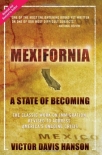Mexifornia: A State of Becoming, Victor Hanson [cool books to read .txt] 📗

- Author: Victor Hanson
Book online «Mexifornia: A State of Becoming, Victor Hanson [cool books to read .txt] 📗». Author Victor Hanson
To the alien from Mexico, so often young and male, immediate inclusion into this new dynamic civilization has had a startling effect - perhaps deleterious to his moral development, to be sure; but for the purposes of immediate assimilation, on the other hand, undeniably good. Movies have sexy women of all colors. Images of a Hispanic Penelope Cruz dating Anglo Tom Cruise splash across magazine covers. The public cares little what color are Oprah, the Williams sisters, Tiger Woods, Jennifer Lopez (most recently engaged to Ben Affleck), Ricky Martin or Antonio Banderas. The only requisites for success in this glitzy culture are charm, athleticism, looks and pizzazz - none of it the property of any one ethnicity. If a Latina is curvy, she not only captures more attention than a rail-thin white woman - such universally human propensities and tastes are hardly new - but for the first time wins commensurate money, status and celebrity as a pinup in a world where the prejudices of the past are shown to be money-losers in the present.
The result is that millions of illegal aliens are seeing brown women and men arm in arm with blacks, Asians and whites at Food4Less and Starbucks, but also in limousines and giving celebrity interviews. Superficial equality? Perhaps. But again, for the first time in civilized memory all the old readily perceivable biases are simply vanishing - and that does affect a deeper reality. What class divisions we have are far more fluid than Europe's or Asia's. Money - a much fairer and more fluctuating barometer of status than birth and breeding - can put a prosperous cesspool franchiser on the local ballet board and lead his kids to be courted by the top universities.
This almost instantaneous blending of the social classes through shared cravings has, of course, nearly wrecked the efforts of immigrants to hold onto traditional Mexican life. I might complain that Chicano Dance instructors at my university are not providing our students with the necessary educational tools to succeed; they will lament in turn that their immigrant constituents are hopelessly hooked on rap music and would not be able to recognize a Mexican folk ballad without some instruction.
Consumerism in its most recent manifestation explains a great deal of the pathologies of second-generation Mexicans who grew up on violent video games, rap music, junk food, hanging at the mall, and without any of the strictures of traditional Mexican society such as the patriarchal family, church and extended kin. Yet for good or evil, the new America, unlike that even of the 1950s, now hardly objects to racial integration, intermarriage and open housing. What that means is there are almost no institutional barriers and few cultural impediments to assimilation - apart from those promoted by ideologues and intellectuals. While some Americans worry that illegal aliens are bringing their own culture up here, the aliens' extended families at home lament that our culture - even -is down there.
My nephew and niece lost their Spanish at four years of age. They don't know anything now of their grandparents' village in Mexico. Their father was an illegal alien dishwasher; twenty-five years ago he took them to his Mexican village before granting custody to his ex-wife and her new husband, my twin brother. Both adults now, they date Anglos, South Americans, Asians and almost anyone they find attractive. They themselves are unsure whether they are half Mexican or half "white." And they don't care, anyway. If you told their friends that they were Spanish, Italian, Greek or Cuban, nobody would know the difference. My other brother's wife is Mexican-American; her father lives in Mexico City - and survives on his hard-earned American Social Security checks. Assimilation, in other words, through both intermarriage and shared consumerism, works. As far as I can tell, no one in my family as of yet has called for a Republica del Norte.
My neighbor is married to a Japanese woman; their daughter married a Mexican-American; their grandson - one-quarter Anglo, one-quarter Japanese, one-half Mexican - is now being raised by an Anglo stepfather. Nor is such racial complexity, a Tiger Woods sort of amalgam, at all atypical in California, at least outside the faculty suburb. No wonder that the race industry is perplexed that its Neanderthal rubrics from the glory days of the 1960s ("check here for Anglo, Hispanic, non-Mexican Latino, African-American, etc.") increasingly make little sense to anyone. What all these people have in common is that their dress, patois and tastes are becoming more homogeneous. And these propensities are predicated on the democratic principle that what is most accessible to the most people sells (the annual so-called Hispanic market represents $300 billion in sales), and what is not, doesn't. I used to hear Spanish ballads out in the fields, blaring on the radios of plum pickers. Such campesinos themselves wore khaki-like uniforms with straw hats and said "si senor - no senor" when told to pick fruit by color or size. They looked and acted like the peasants in The Treasure of the Sierra Madre. Now the illegal alien plays ghetto-inspired rap, wears his baseball cap backwards, is amply tattooed, and is more likely to answer "OK already" or "No problema" - mimicking Schwarzenegger rather than speaking Spanish. I miss the old world; those in this new world would not.
If one were a small farmer trying to keep alive a traditional agrarian way of life for his children, if one were a third-generation Japanese small nurseryman struggling to survive amid a parking lot full of cheap plants at Orchard Supply, if one were proud of his Punjabi roots, religion, dance and customs and wished his daughter to preserve an ancestral way of





Comments (0)